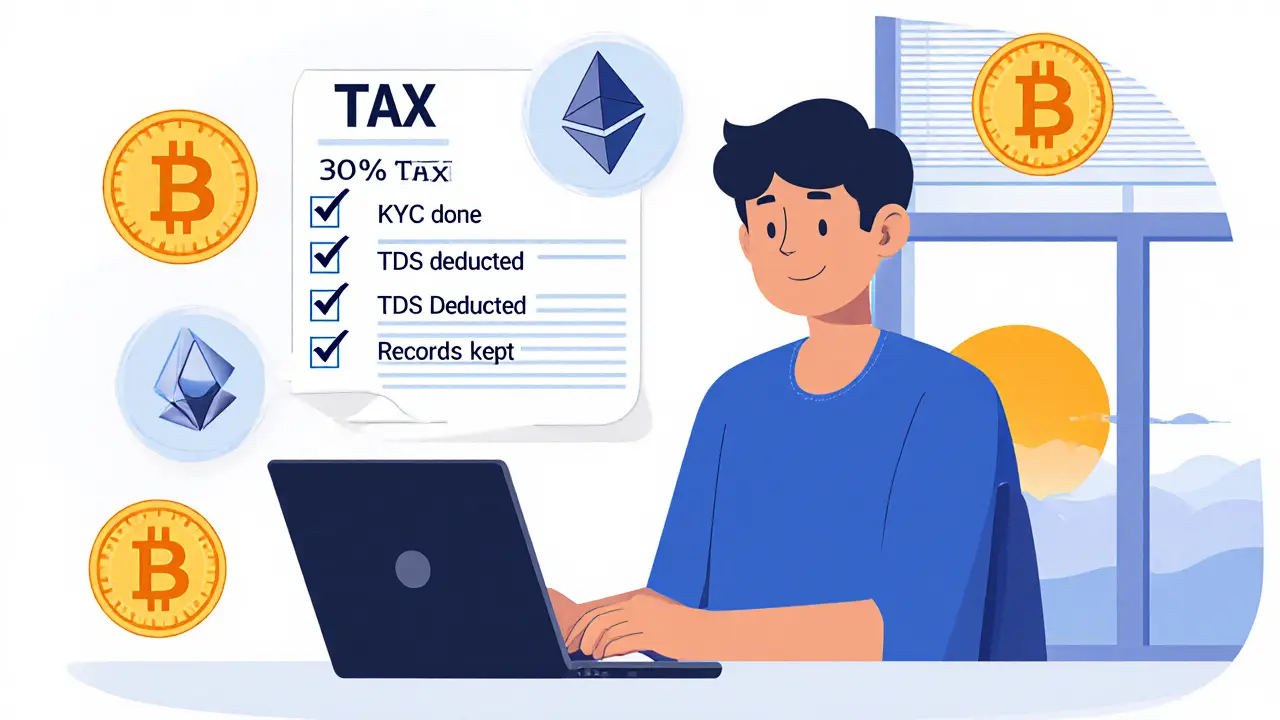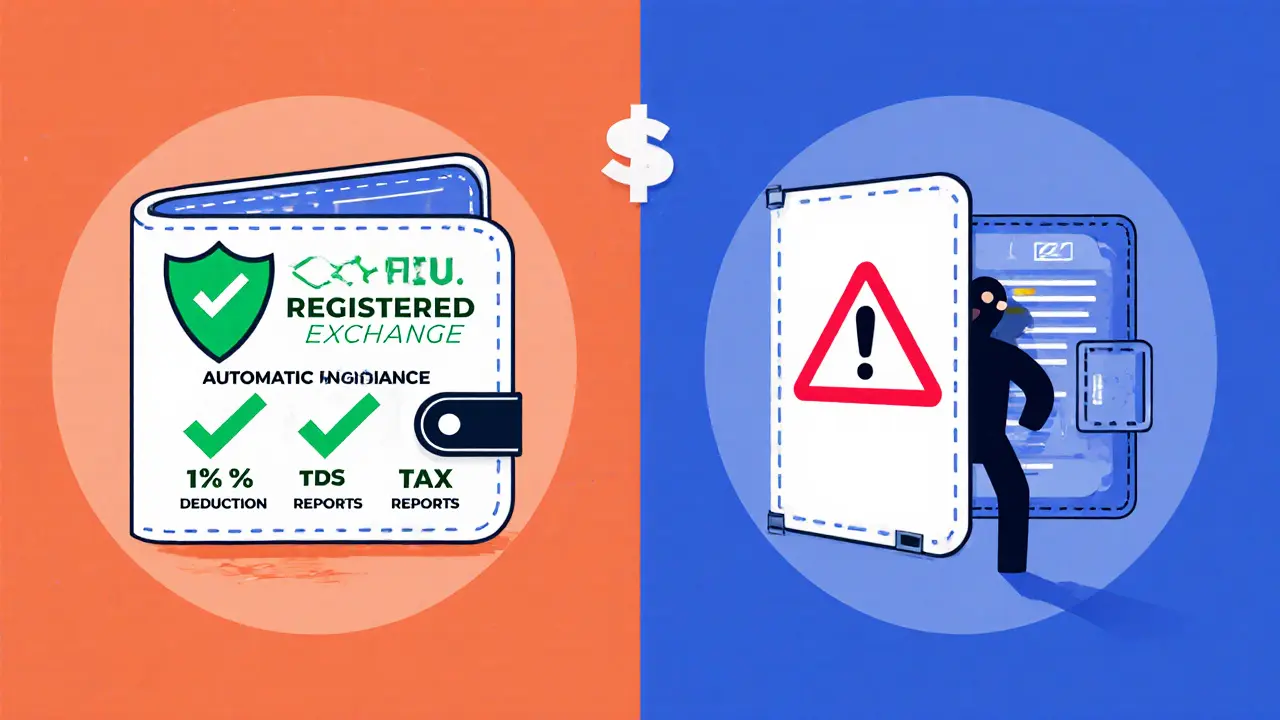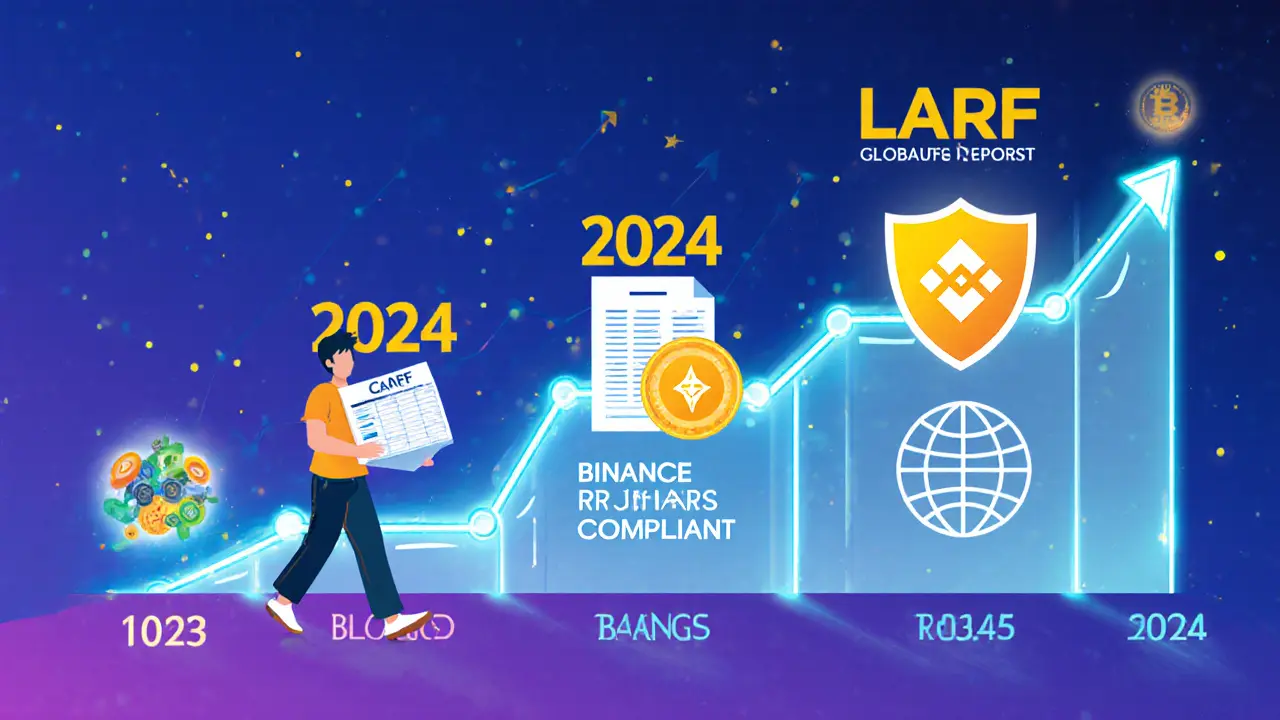
India Crypto Tax Calculator
Calculate Your Tax Liability
This tool helps you calculate your mandatory 30% capital gains tax and 1% TDS on crypto transactions in India based on current regulations.
Your Tax Liability
Important Compliance Notice: Using non-FIU-IND registered exchanges may result in penalties up to 200% of tax due and bank account freezes. Always track transactions and maintain records for at least 6 years.
How This Affects You
- 30% tax applies to all profit No deductions allowed
- 1% TDS deducted at source Even on losses
- Must file ITR with Schedule VDA Required by law
India doesn’t ban cryptocurrency. That’s the first thing you need to understand. There’s no law saying you can’t own Bitcoin, Ethereum, or any other digital asset. What you can’t do is ignore the rules. The government doesn’t want to stop you from trading - it wants to track you, tax you, and make sure no one’s laundering money through crypto.
So if you’re asking how to avoid crypto restrictions in India, the real answer is: you don’t. You don’t avoid them. You follow them. The only way to keep trading safely is to play by the rules - and those rules are clear, strict, and enforced.
What’s Actually Restricted in India?
There are no outright bans on buying, selling, or holding crypto. You can’t use it as legal tender - you can’t pay for your chai with Bitcoin. But you can buy it, sell it, hold it, and even earn interest on it through regulated platforms.
The real restrictions aren’t about ownership. They’re about how you do it. The government has shut down 25 crypto platforms since 2023 for failing to register with the Financial Intelligence Unit India (FIU-IND). These were exchanges that didn’t collect KYC data, didn’t report suspicious transactions, and didn’t deduct taxes at source.
Platforms like BingX and LBank got blocked. Binance? They came back in August 2024 - after hiring Indian compliance teams, setting up local data storage, and starting to deduct 1% TDS on every trade. The message is simple: comply or get cut off.
The Two Big Rules You Can’t Ignore
There are two non-negotiable compliance requirements for anyone trading crypto in India:
- 30% tax on all profits - Whether you made $100 or $100,000 from selling Bitcoin, swapping Ethereum for Solana, or earning staking rewards, you pay 30% in income tax. No deductions. No offsets. No losses can be carried forward. This is the highest flat crypto tax rate in the world.
- 1% TDS on every transaction - Every time you buy or sell crypto on a registered exchange, they automatically take 1% of the transaction value as tax. That’s not a fee - it’s a government tax deduction. If you buy $1,000 worth of Bitcoin, $10 gets withheld. If you sell $500 of Ethereum, $5 gets taken. This happens even if you’re breaking even or losing money.
These aren’t suggestions. They’re enforced by law under the Income Tax (No. 2) Bill, 2025, which replaced the old Income Tax Act. The tax department can pull your bank records, your exchange history, and your wallet addresses. If your income doesn’t match your spending, you’ll get a notice.
Use Only FIU-IND Registered Exchanges
Here’s where most people get it wrong. They try to use offshore exchanges - Binance.com, Kraken, KuCoin - thinking they can avoid TDS or hide their trades. That’s dangerous.
Indian exchanges like WazirX, CoinDCX, and Zebpay are registered with FIU-IND. That means they:
- Collect your ID, address, and PAN card
- Report all your trades to the tax department
- Deduct 1% TDS automatically
- Provide annual tax reports (Form 16A or similar)
Offshore exchanges? They don’t report to India. But here’s the catch: if you transfer crypto from an offshore wallet to an Indian exchange, the Indian platform will flag it as an incoming deposit. If you later sell it, the tax department will see the purchase price was $0 - and tax you on the full sale amount. That’s how they catch people trying to hide trades.
Even if you never use an Indian exchange, if you cash out to your Indian bank account, the bank will report large deposits to FIU-IND. And if your crypto gains don’t match your declared income, you’re on the radar.

Keep Perfect Records - Even If You’re Not a Business
You don’t need to be a trader to be audited. The tax department doesn’t care if you bought Bitcoin as a hobby. If you sold it for profit, you owe tax.
Start a simple spreadsheet. Track:
- Date of each transaction
- Type (buy, sell, swap, receive, send)
- Amount and currency
- Value in INR at the time
- Exchange used
- Transaction ID
Why? Because calculating gains on crypto-to-crypto trades is messy. If you bought 0.1 BTC for ₹300,000 in January, then swapped it for 5 ETH in June when ETH was ₹60,000 each, you just made a ₹300,000 profit - even if you didn’t touch INR. That’s taxable.
Use tools like Koinly or CoinTracker (they work in India) to auto-import transactions from exchanges and generate tax reports. Save everything for at least six years. Indian tax law requires you to keep records that long.
What Happens If You Don’t Comply?
People think they’ll get away with it. They don’t. Here’s what happens when you ignore the rules:
- Penalties up to 200% of tax due - If you underreport income, you could pay double what you owe.
- Legal notices from the Income Tax Department - You’ll get a notice demanding proof of source of funds. No proof? You’re in trouble.
- Bank account freezes - If FIU-IND flags your account for suspicious activity, your bank can freeze it while they investigate.
- Criminal investigation - If they suspect money laundering or fraud, the Enforcement Directorate can step in. That’s not a tax issue anymore - that’s a criminal case.
There are real cases. In 2024, a trader in Hyderabad was fined ₹1.8 crore for undeclared crypto gains over three years. He didn’t use an Indian exchange. He thought he was safe. He wasn’t.

What About Peer-to-Peer (P2P) Trading?
P2P platforms like LocalBitcoins or Paxful are popular in India because they let you trade directly with other people. But here’s the truth: if you’re buying crypto via P2P and then selling it on an Indian exchange, the exchange still sees the deposit and reports it. The tax department connects the dots.
If you’re selling crypto via P2P and receiving INR directly into your bank account - that’s a red flag. Banks report large cash deposits. If your salary is ₹6 lakh a year and you suddenly deposit ₹15 lakh from P2P crypto sales, you’ll get questioned.
There’s no magic workaround. P2P doesn’t make you invisible. It just makes it harder to track your gains - which makes the tax department more suspicious.
How to Stay Legal - Step by Step
Here’s how real Indian crypto traders stay out of trouble:
- Use only FIU-IND registered exchanges (WazirX, CoinDCX, Zebpay, Bitbns)
- Complete full KYC - no shortcuts
- Let the exchange deduct 1% TDS - don’t try to bypass it
- Track every single transaction in a spreadsheet or crypto tax tool
- Calculate your gains quarterly - don’t wait until March
- File your ITR with Schedule VDA (Virtual Digital Asset) included
- Consult a crypto-savvy CA if you’re doing frequent trades or complex swaps
It takes about 2-3 months to get comfortable with this system. After that, it’s routine. Most traders say the stress isn’t from the tax - it’s from the fear of getting caught. Once you’re compliant, the fear disappears.
The Future: More Rules, Not Fewer
India isn’t backing down. In fact, it’s getting stricter. The government is working with the G20 and the Financial Stability Board to adopt the Crypto-Asset Reporting Framework (CARF), which will force exchanges worldwide to share Indian user data automatically.
That means even if you use a U.S.-based exchange, they’ll soon be required to report your trades to India. Hiding your crypto activity won’t work much longer.
What’s coming next? Possibly a licensing system for crypto exchanges, stricter wallet tracking, and mandatory reporting of DeFi transactions. The goal isn’t to ban crypto - it’s to bring it fully into the financial system.
So the real question isn’t how to avoid restrictions. It’s: how do you adapt to them?
The answer is simple: don’t fight the system. Work within it. Keep records. Pay your tax. Use compliant platforms. That’s not avoidance - that’s how you keep trading safely in India.
Brett Benton
1 11 25 / 22:35 PMIndia’s crypto rules are actually kinda refreshing. No bans, just transparency. I used to think tax = bad, but this? It’s like they’re saying ‘we know you’re here, let’s make it clean.’ No shady offshore stuff, no guessing games. Just report, pay, and move on. Honestly, it’s more honest than half the US crypto scene.
Jeremy Jaramillo
3 11 25 / 05:52 AMMost people don’t realize the 1% TDS isn’t a fee-it’s a built-in tax withholding. It’s like payroll taxes for crypto. You don’t have to calculate it yourself. The exchange does it. That’s actually a huge relief if you’re not a CPA.
Bruce Bynum
4 11 25 / 20:39 PMUse WazirX. Do KYC. Track everything. Pay the 30%. That’s it. No magic. No loopholes. Just do the work and stop stressing.
Edgerton Trowbridge
6 11 25 / 09:30 AMIt is imperative to note that the regulatory framework established by the Financial Intelligence Unit India (FIU-IND) represents a paradigm shift in the treatment of virtual digital assets within the Indian financial ecosystem. Compliance is not optional; it is codified under statutory obligation pursuant to the Income Tax (No. 2) Bill, 2025. Failure to adhere to prescribed reporting mechanisms may result in severe fiscal and legal repercussions, including but not limited to penalties, account freezes, and potential criminal investigation by the Enforcement Directorate.
Matthew Affrunti
8 11 25 / 01:16 AMI started trading crypto in India last year and honestly, it’s way less scary than I thought. Once I got used to tracking trades and using CoinTracker, it became routine. The 1% TDS is annoying but fair. I’d rather pay 30% than get a notice from the tax department.
Eliane Karp Toledo
9 11 25 / 19:37 PMThey say 'no ban' but they’re just making it impossible to use crypto without giving them your entire life. KYC? TDS? Bank reports? This isn’t regulation-it’s surveillance capitalism with a tax sticker. They don’t want you to trade. They want you to beg for permission.
Phyllis Nordquist
11 11 25 / 19:15 PMThe assertion that offshore exchanges pose a significant risk due to unreported deposits is substantiated by empirical data from FIU-IND’s 2024 compliance reports. Transactions originating from non-compliant platforms, when subsequently liquidated through registered Indian exchanges, trigger automatic flagging due to zero-cost-basis discrepancies. This mechanism effectively eliminates the possibility of tax evasion through unregistered wallet transfers. It is therefore advisable to maintain all transactional records, regardless of platform origin, to ensure audit readiness.
David Roberts
12 11 25 / 17:38 PMthe 30% tax is insane. but the real issue? they dont even let you offset losses. so if you lose 50k on altcoins and make 10k on btc? you still pay 3k. thats not tax, thats robbery. and the tds? its like theyre taxing you for breathing. you buy 1000usd btc? 10usd gone. even if you sell it for 900. they dont care. they just want their cut. and dont even get me started on p2p. banks are watching every rupee. its a police state for crypto. they dont want innovation. they want control.
Monty Tran
14 11 25 / 09:14 AMIndia is not banning crypto they are monetizing it. Every transaction is a revenue stream. Every wallet is a data point. Every trade is a tax event. This isn’t regulation. It’s extraction dressed up as policy. The government isn’t protecting you. They’re harvesting you.
Hanna Kruizinga
14 11 25 / 18:27 PMThey’re tracking everything. Even your P2P cash deposits. Even your off-chain swaps. The tax department has AI that links wallet addresses to bank accounts. They don’t need you to use Indian exchanges. They just need you to cash out. You think you’re hidden? You’re not. You’re just a spreadsheet waiting to happen.
Nabil ben Salah Nasri
16 11 25 / 09:21 AMUse Koinly. It’s free for basic use. Auto-imports from WazirX, CoinDCX, even Binance US if you’re dumb enough to use it. Saves hours. And yeah, the 30% tax sucks, but at least you’re not getting a notice from the IT dept. I used to hate tracking, now I do it every Sunday. It’s like budgeting, but with more crypto memes.
alvin Bachtiar
18 11 25 / 06:01 AMLet’s be real: this isn’t about taxation-it’s about control. The 1% TDS is a psychological leash. They don’t want you to think you’re trading. They want you to feel like you’re paying tolls on a highway they built. And the 30% flat tax? That’s not revenue-it’s a deterrent. They want retail traders to quit. And guess what? It’s working. The only people still in are the ones who treat crypto like accounting, not gambling. Sad, but true.
Bhavna Suri
18 11 25 / 16:52 PMWhy are people even trading crypto in India? The rules are too strict. The taxes are too high. The government doesn’t trust us. We should just stick to gold or fixed deposits. At least those don’t come with a tax spy.
Genevieve Rachal
19 11 25 / 09:27 AMAnyone who says this is 'fair' is either a tax accountant or a government shill. You can't offset losses. You can't use foreign exchanges. You can't even swap tokens without being taxed. This isn't regulation-it's a trap designed to make crypto unviable for normal people. The only winners are the exchanges collecting fees and the tax department collecting blood money.
Eli PINEDA
19 11 25 / 17:57 PMwait so if i swap eth for sol on binance and then send to wazirx and sell… they tax me on the full amount? but i didnt even get inr? what if i just hodl? do they still care? i’m so confused
Debby Ananda
21 11 25 / 03:41 AMHow quaint. India thinks it can regulate something as decentralized as crypto? The blockchain doesn’t care about your FIU-IND forms. This is the last gasp of centralized control before the real revolution. You’re not tax collectors-you’re dinosaurs holding onto a typewriter while the world moves to the cloud.
Vicki Fletcher
23 11 25 / 01:30 AMWait, so if I buy 0.1 BTC for ₹3L, then swap it for 5 ETH, and then sell the ETH for ₹4L… I owe tax on ₹1L profit? But I never touched INR? That feels wrong. And what if I just send the ETH to a friend? Is that a gift? Do I still owe tax? I need a lawyer… or a time machine.
Nadiya Edwards
23 11 25 / 19:31 PMThey’re coming for our freedom. First it was cash. Then it was crypto. Next, it’ll be our data, our thoughts, our dreams. This isn’t about taxes. It’s about the end of privacy. They want to know what you bought, when you bought it, and how much you made. And if you didn’t pay? They’ll take your house. They already have the paperwork.
Malinda Black
25 11 25 / 07:09 AMFor anyone new to this: start simple. Use one exchange. Do KYC. Let them take the 1%. Track your buys and sells in a Google Sheet. Don’t overthink it. The tax isn’t the enemy-the fear is. Once you’re compliant, you can actually enjoy crypto again. I used to lose sleep over it. Now I just check my sheet every Sunday. Peaceful.